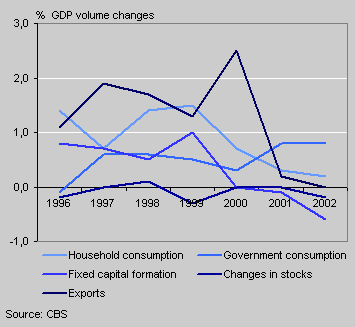Government powers economic growth

Consumption expenditure of the Dutch government contributed most to economic growth in 2001 and 2002. Without this government contribution there would have been virtually no economic growth in 2001 and negative growth in 2002.
2001–2002: government supports economic growth
The years 2001 and 2002 were characterised by diminished economic growth. In 2001 the Dutch Gross Domestic Product increased by 1.2 percent. In 2002 it was a mere 0.2 percent.
The slump in the world market limited the contribution of exports to the economic growth. Household consumption also only increased modestly. Consumption expenditure by the Dutch government kept the economy alive in 2001 and 2002.
Economic growth by sector

1997: export powers the economy
During the economic boom of 1996–2000, with growth rates between 3.0 and 4.3 percent, government only made a minor contribution to growth. In 1996 household consumption was the main contributor, in 1997 it was exports. With a 50 percent share in growth, exports powered the economy.
1998: strong growth in national expenditure
In 1998 the Dutch economy expanded most: 4.3 percent. This was thanks to national expenditure. Household and government consumption expenditure accounted for nearly half the growth. Households spent a lot of money on luxury goods such as cars, computers and mobile phones. In government the expenditure increased on sheltering asylum seekers and on prisons.
1999: growth widely supported
Economic growth in 1999 was supported widely. Consumption, investments and exports all contributed substantially to the 4 percent growth rate.
In 2000 a recovering world market made for expanding exports, contributing no less than 70 percent of GDP growth.
2002: Great expenditure on health care and education
In 2001 and 2002 government was doing the work in the economy. It spent more money on health and welfare, education and public government in both years.
Taeke Takema